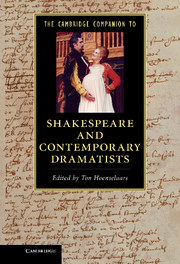Book contents
- Frontmatter
- Contents
- Illustrations
- Contributors
- Preface
- Chronology of the life and work of Shakespeare and contemporary dramatists
- 1 John Lyly and the University Wits
- 2 Thomas Kyd and the Elizabethan blockbuster
- 3 ‘The words of Mercury’
- 4 The dyer’s hand
- 5 Urbane John Marston
- 6 Thomas Dekker and the emergence of city comedy
- 7 Shakespeare
- 8 Thomas Heywood
- 9 George Chapman’s learned drama
- 10 Francis Beaumont and John Fletcher’s tragicomedy as musical melodrama
- 11 Thomas Middleton and the early modern theatre
- 12 John Webster
- 13 John Ford
- 14 Philip Massinger
- 15 Richard Brome and the idea of a Caroline theatre
- 16 Troublesome histories
- Select bibliography
- Index
- References
6 - Thomas Dekker and the emergence of city comedy
Published online by Cambridge University Press: 05 December 2012
- Frontmatter
- Contents
- Illustrations
- Contributors
- Preface
- Chronology of the life and work of Shakespeare and contemporary dramatists
- 1 John Lyly and the University Wits
- 2 Thomas Kyd and the Elizabethan blockbuster
- 3 ‘The words of Mercury’
- 4 The dyer’s hand
- 5 Urbane John Marston
- 6 Thomas Dekker and the emergence of city comedy
- 7 Shakespeare
- 8 Thomas Heywood
- 9 George Chapman’s learned drama
- 10 Francis Beaumont and John Fletcher’s tragicomedy as musical melodrama
- 11 Thomas Middleton and the early modern theatre
- 12 John Webster
- 13 John Ford
- 14 Philip Massinger
- 15 Richard Brome and the idea of a Caroline theatre
- 16 Troublesome histories
- Select bibliography
- Index
- References
Summary
In the trilogy of university plays known as The Parnassus Plays, produced at St John’s College, Cambridge, between 1589/9 and 1602/3, a recurrent concern is expressed about the professional fate of the growing number of graduates the universities were turning out by the end of the sixteenth century. This includes a worry about the popularisation of modes of discourse that are considered in the plays more properly to be the province of the social and educational elite and, these being university plays, the drama comes in for specific attention. Gullio, a fool in The Second Part of the Return from Parnassus, is an admirer of Shakespeare and he draws his ‘shreds of poetrie’ from the theatre. It is a source of discomfort in the play that drama as a mode of literary writing that is ultimately the product of learning should be indiscriminately peddled in the marketplace of the public theatres. The play also contains the dramatisation of real figures from that theatre – Will Kempe and Richard Burbage – who in their turn criticise the dramatic writing of scholars:
Few of the vniuersity [men] pen plaies well, they smell too much of that writer Ouid, and that writer[’s] Meta-morphoses, and talke too much of Proserpina & Iuppiter. Why heres our fellow Shakespeare puts them all downe, I and Ben Ionson too. O that Ben Ionson is a pestilent fellow, he brought vp Horace giuing Poets a pill, but our fellow Shakespeare hath giuen him a purge that made him beray his credit.
(1766–7)- Type
- Chapter
- Information
- Publisher: Cambridge University PressPrint publication year: 2012



